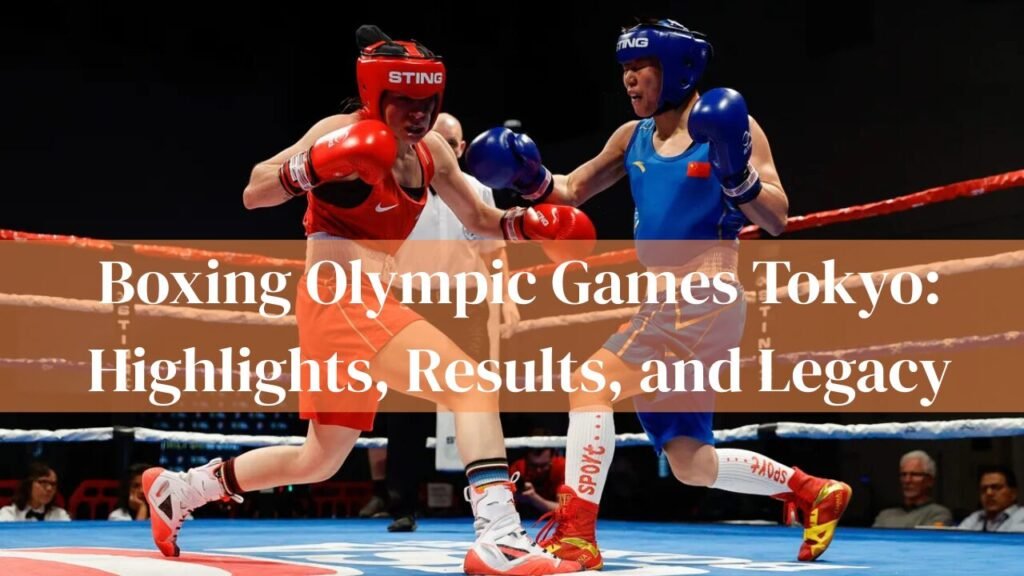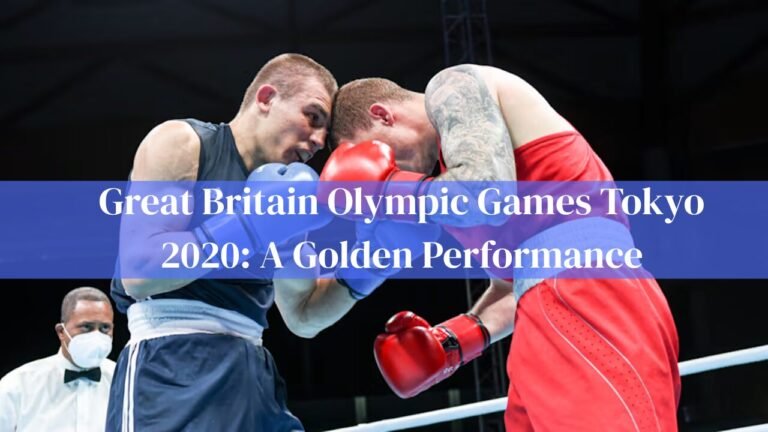The Boxing Olympic Games Tokyo brought intense action, global rivalries, and a renewed focus on amateur boxing to the world stage. Held as part of the 2020 Summer Olympics, the boxing events took place from July 24 to August 8, 2021, at the Ryōgoku Kokugikan in Tokyo, Japan. Despite being delayed by a year due to the COVID-19 pandemic, the boxing competition proved to be one of the most engaging segments of the Olympics, offering audiences around the globe a chance to witness high-level athleticism and the true spirit of Olympic competition. The event not only highlighted the physical prowess and technical skills of elite amateur boxers but also demonstrated the resilience, discipline, and mental fortitude required to compete at the highest level of international sport.
In this article, we will break down the highlights of the Tokyo boxing games, analyze top-performing nations, profile key athletes, explain the complex qualification processes, and explore what the future holds for Olympic boxing. By examining the Olympics through an expert lens, readers will gain a comprehensive understanding of how these Games shaped the global boxing landscape and contributed to the growth of the sport.
Olympic Boxing Format at Tokyo 2020
Boxing at the Olympics is exclusively for amateur fighters, governed by a strict set of rules designed to prioritize safety, fairness, and competitive balance. Unlike professional boxing, Olympic bouts emphasize clean technique, tactical strategy, and precise execution. The Tokyo 2020 Olympics featured thirteen weight categories, including eight for men and five for women, reflecting a deliberate effort by the International Olympic Committee (IOC) to enhance gender equality and inclusivity within the sport. The careful structuring of these weight classes ensures athletes compete against opponents of similar size and strength, which is critical for maintaining competitive integrity.
Key Format Details
Olympic boxing follows a single-elimination tournament structure, meaning each bout carries the weight of elimination. Fighters must demonstrate not only superior physical conditioning but also mental acuity, as one mistake can end their journey. Each bout consists of three rounds, with each round lasting three minutes, providing a high-intensity yet controlled environment that tests speed, endurance, and strategy. Five judges score each bout, evaluating competitors on clean punching, defensive skill, technique, and overall dominance within the ring. Notably, male boxers compete without headgear, a rule introduced at the Rio 2016 Olympics to reduce the risk of concussions and encourage better defensive strategies, while female competitors continue to use protective headgear, reflecting ongoing considerations for safety and fair play.
Qualification for the Boxing Olympic Games Tokyo
The qualification pathway for Olympic boxing is rigorous and often fraught with complexity. For the 2020 Games, the International Boxing Association (AIBA) initially oversaw the qualification process. However, due to concerns over governance, transparency, and corruption within AIBA, the International Olympic Committee assumed responsibility to ensure fairness and accountability. Athletes earned their Olympic spots through a combination of continental qualification tournaments across Africa, Asia/Oceania, Europe, and the Americas. These tournaments were designed to identify top talent from each region, creating a diverse and competitive field that reflected the global nature of the sport.
The COVID-19 pandemic introduced unprecedented challenges to this process. The final world qualification event was canceled, prompting the IOC to allocate the remaining spots based on global rankings. While this approach ensured that highly skilled athletes could still compete, it also generated disappointment among those who had relied on live tournaments to secure their Olympic dreams. This unusual scenario demonstrated both the flexibility and limitations of the qualification system, emphasizing the need for robust contingency planning in global sports governance.
Highlights and Results: Who Took Home the Gold?
The Tokyo 2020 Olympic boxing competition produced unforgettable moments and remarkable achievements. Nations with a strong heritage in amateur boxing demonstrated their dominance, while emerging programs surprised the world with breakout performances. The event showcased a rare combination of technical skill, strategic intelligence, and emotional resilience, making it a highlight of the Tokyo Games.
Top Performing Nations
Cuba continued its historic legacy in amateur boxing by securing four gold medals, reaffirming its position as a powerhouse in the sport. Cuban athletes are renowned for their rigorous training, disciplined approach, and deep understanding of boxing fundamentals, making them perennial contenders in the Olympic arena. Great Britain impressed with two gold medals alongside multiple other podium finishes, highlighting the country’s investment in youth development, coaching infrastructure, and high-performance programs. The United States, after modest performances in previous Olympics, returned to prominence with one gold medal and several bronze finishes, signaling a renewed focus on amateur boxing at the national level.
Notable Gold Medalists
Buse Naz Cakiroglu of Turkey captured the women’s flyweight gold, demonstrating exceptional speed, technique, and adaptability in the ring. Roniel Iglesias of Cuba triumphed in the men’s welterweight division, showcasing tactical brilliance and relentless stamina. Lauren Price from Great Britain achieved victory in the women’s middleweight category, highlighting both technical skill and psychological resilience under intense pressure. Albert Batyrgaziev of Russia emerged victorious in the men’s featherweight division, combining precision striking with strategic maneuvering to outclass his competitors. Each of these athletes exemplifies the Olympic ideal, blending physical excellence with mental strength, perseverance, and a commitment to representing their nations on the global stage.
Women’s Boxing Continuing the Rise
One of the most significant developments at Tokyo 2020 was the continued evolution of women’s boxing. With five official weight categories, women received their most comprehensive representation in Olympic history. This milestone reflects broader efforts to promote gender equality in sport and provides female athletes with a platform to showcase their talent at the highest level.
Kellie Harrington of Ireland won gold in the women’s lightweight division, delivering an emotionally compelling and technically flawless performance that resonated with audiences worldwide. Her victory was a testament to years of disciplined training, strategic mastery, and unyielding determination. Nesthy Petecio from the Philippines made history by securing a silver medal, marking a watershed moment for Filipino sports and inspiring countless young women in her home country to pursue boxing. These achievements underscore that women’s boxing is no longer a peripheral category but a central and celebrated component of Olympic combat sports, demonstrating the growing recognition and opportunities for female athletes globally.
COVID-19 Challenges and Protocols
The Tokyo Olympics took place under unprecedented circumstances due to the COVID-19 pandemic. The Games were conducted without spectators, creating a unique and sometimes surreal environment in arenas that traditionally thrive on audience energy and enthusiasm. Athletes navigated stringent safety measures, including daily testing, controlled movement within bio-secure bubbles, and mental isolation designed to minimize exposure risk. These conditions placed additional psychological and logistical demands on competitors, yet the boxers exhibited remarkable resilience, focus, and adaptability.
Many athletes trained under lockdown conditions, with restricted access to gyms, coaches, and sparring partners. Despite these limitations, they maintained peak physical conditioning and technical proficiency, demonstrating the extraordinary dedication required to compete at the Olympic level. The combination of pandemic-related challenges and elite competition underscored the mental toughness inherent to Olympic boxing and added a layer of admiration to the accomplishments witnessed in Tokyo.
What’s Next for Olympic Boxing?
Looking ahead, the trajectory of Olympic boxing is both promising and uncertain. The Paris 2024 Olympic Games are expected to maintain boxing as a key sport, yet governance concerns persist. The International Olympic Committee continues to closely monitor the International Boxing Association (IBA, formerly AIBA) to ensure transparency, ethical conduct, and effective leadership reforms. The success and credibility of boxing at Paris 2024 may hinge on these oversight efforts.
Anticipated developments include potential adjustments to weight categories to better reflect evolving athlete participation trends, continued advancement of gender equality through expanded women’s events, and stricter regulations on judging and scoring systems to minimize controversies. The ongoing reforms aim to restore confidence in the sport’s governance and ensure that Olympic boxing continues to meet the highest standards of fairness, safety, and competitive integrity.
Real World Impact: Growth of Grassroots and Local Programs
Olympic boxing extends its influence beyond the elite level, driving growth at grassroots and community levels. Following the Tokyo Games, numerous boxing clubs worldwide reported increased interest and enrollment, particularly among youth. High-profile athletes served as role models, inspiring the next generation to pursue the sport with ambition and dedication.
In the United Kingdom, athletes such as Benjamin Whittaker and Galal Yafai became prominent figures, encouraging young people to engage in structured training programs. Similarly, in the Philippines and Ireland, the success of Nesthy Petecio and Kellie Harrington generated heightened awareness and participation in boxing programs. These trends highlight the transformative power of Olympic exposure, demonstrating that success on the world stage can have tangible impacts on local communities and inspire emerging talent to pursue excellence.
FAQs
What dates did boxing take place in Tokyo 2020?
The boxing events were conducted from July 24 to August 8, 2021, at the Ryōgoku Kokugikan Arena in Tokyo, providing a two-week showcase of elite amateur boxing across multiple weight divisions.
How many boxing categories were there?
Tokyo 2020 featured thirteen weight classes in total, with eight for men and five for women, reflecting a concerted effort to achieve gender balance while maintaining competitive integrity across weight divisions.
Who was the top boxing nation at Tokyo 2020?
Cuba led the medal tally with four gold medals, reinforcing its longstanding reputation as a powerhouse in Olympic boxing and continuing a legacy of excellence in amateur competition.
Why was there no headgear in men’s boxing?
The removal of headgear for men was introduced at Rio 2016 after research indicated that eliminating headgear reduced the risk of concussions and encouraged fighters to adopt more defensive and technically sound strategies. Women continue to use protective headgear for safety considerations.
Conclusion
The Boxing Olympic Games Tokyo served as a compelling reminder of boxing’s enduring global appeal and cultural significance. From Cuba’s continued dominance to the breakthroughs in women’s divisions, the Tokyo Games delivered historic victories, emotional moments, and demonstrations of technical mastery and perseverance. The athletes’ dedication and skill were further magnified by the extraordinary challenges posed by the COVID-19 pandemic, adding an inspiring layer to their accomplishments.
As the world anticipates the Paris 2024 Olympics, the legacy of Tokyo’s boxing events will continue to influence the sport at both elite and grassroots levels. The Games not only showcased the pinnacle of amateur boxing but also inspired a new generation of athletes, elevated public interest, and reaffirmed boxing’s place as a cornerstone of Olympic tradition. By blending athletic excellence with personal resilience and national pride, the Tokyo boxing competition reinforced the universal values of sport and provided a blueprint for the continued evolution of Olympic boxing in the years to come.


